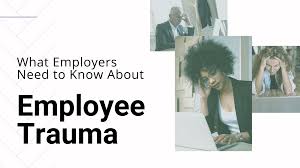PTSD in the Workplace

Is there PTSD in the Workplace? Is it in YOUR workplace? The acronym “PTSD,” short for “post-traumatic stress disorder,” gets thrown around a lot. It is widely recognized in military personnel, combat veterans, and victims of assault. However, the truth is that it can and does affect people that have encountered trauma in many settings, including the workplace.
What Is Workplace PTSD?
PTSD is commonly defined as a psychiatric disorder that develops after witnessing or experiencing extremely traumatic events. Physical symptoms include, nervousness, jitters, insomnia, nightmares, or just startled response. Moreover, a feeling of not being close to others as we experience apathy, anxiety, depression, hopelessness, despair, and even suicidal ideation.
What Triggers Workplace PTSD
There’s not one set of triggers for PTSD. The catalyst can be a stressful event or catastrophic accident. Like, a death or injury that happened at work and was witnessed. And for others, it can be triggered by a perception or realization that they don’t feel physically safe at work. Maybe due to working conditions, exposure to COVID, violence, or another reasons.
Company Culture
The office culture itself can be the cause of PTSD. Ongoing exposure to things like emotional abuse, threatening behaviors, sexual or racial harassment can result in PTSD in the staff. And can be prompted by persistent chronic overwork and unrealistic performance expectations. Or not being given the resources to succeed at your job, and undelivered promises.
HR Needs to Know About Workplace PTSD
Whether it’s caused by the workplace itself or by broader social stressors or current events, it needs to be on HR’s radar. PTSD can negatively impact attendance, job performance, productivity, efficiency, and efficacy. It can also cause accidents, errors, and turnover. An HR should have general knowledge, and training, about trauma, stress, and burnout.
Be Pro-active
Companies should want to be proactive about assisting employees and create a supportive workplace culture. They can provide channels for employees to file reports or complaints about conditions that can trigger the PTSD anonymously. As well as offering mental wellness training for staff that covers awareness, conflict resolution, and effective communication.
Seek Help – You are Important!
Feeling that you are in danger is a sign that you’ve experienced a PTSD trigger. A therapist can help you identify yours. Moreover, they can also help you learn ways to cope. Seek help. And most importantly remember you are enough. You are important!
The Cardinal Culture – Delivering Jobs for 28 years!
Cardinal Staffing Services is not just any staffing company, it is a place you can be inspired to reach the goal of your dreams. We treat our customers and candidates with respect, dignity, and appreciation. We make positive decisions every day that impacts our valued clients, our candidates, and our community. Contact us today!
#WorkplacePTSD #PTSD #PTSDtriggers #cardinalculture #cardinaljobs #culturematters #hotjobs #employeesearch #weeklypay #worktoday #recruiting #factoryjobs #localjobs #immediatehires #referralbonus